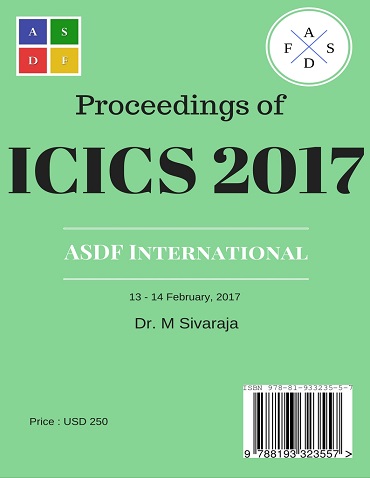- Publication Meta:Value
- Short Title:ICICS 2017
- Publisher:ASDF, India
- ISBN 13:978-81-933235-5-7
- ISBN 10:81-933235-5-6
- Language:English
- Type:Hard Bound - Printed Book
- Copyrights:ICICS Organizers / DCRC, London, UK
- Editor-in-Chief:Dr M Sivaraja
- Conference Dates:13 - 14, February 2017
- Venue Country:Karur, India
- Submitted Papers:456
- Acceptance Rate:8.08%
- Website:www.icics.asia
Welcome to ASDF Electronic Digital Library!
ICICS 2017
ICICS 2017
International Conference on Intelligent Computing and Systems 2017
Paper 030
Parameter Optimization of EDM Process by Response Surface Methodology in AISI 304 Stainless Steel
Gunashankar M1, Mathankumar C2, Karthick P3, Vijay Varshidh V4, Vignesh Ravi S5
1,3,4Chettinadu College of Engineering, India
2,5NSN College of Engineering and Technology, India
Abstract
EDM has become an important and cost-effective method of machining extremely tough and brittle electrically conductive materials. It is widely used in the process of making mould/dies, automobile and electronics industries where intricate complex shapes need to be machined in very hard materials. The work piece material selected in this experiment is AISI 304 Stainless steel taking into account its wide usage in industrial applications and it is very difficult to machine by conventional machining. The tool material selected in this experiment is copper based on the good electrical conductivity compared to other tool materials like brass, tellurium copper and graphite. In this work, the influence of variable process parameters such as pulse current, pulse on time, pulse off time, discharge current, gap distance and machining time over performance characteristics like material removal rate, tool wear rate, and different aspects of surface integrity for AISI 304. Stainless steel such as topography of machined surface, MRR, Tool Wear Rate, and surface will be investigated. The variations of material removal rate, tool wear rate versus input machining parameters will be optimized by using Response Surface Methodology which allows us to get best output characteristics.
Keywords
Author's Profile
Author profile can be generated and linked through our partners World Book of Researchers. To include your profile online Click Here. After it is approved, please email to edlib @ asdf.res.in to create a link with all the papers.
e-AID
ICICS.2017.030
Cite this Article as Follows
Gunashankar M, Mathankumar C, Karthick P, Vijay Varshidh V, Vignesh Ravi S. "Parameter Optimization of EDM Process by Response Surface Methodology in AISI 304 Stainless Steel." International Conference on Intelligent Computing and Systems (2017): 15. Print.
© 2010 - by EDLIB .
All Rights Reserved.

